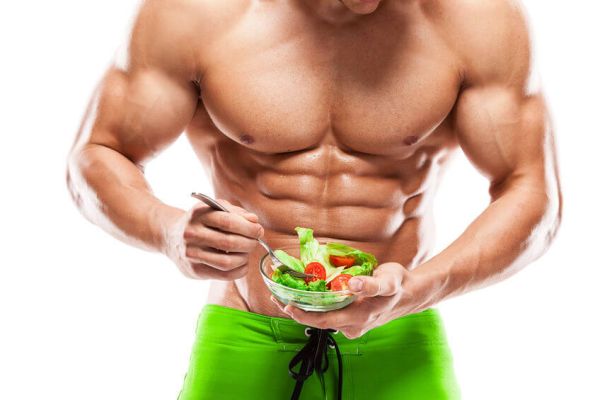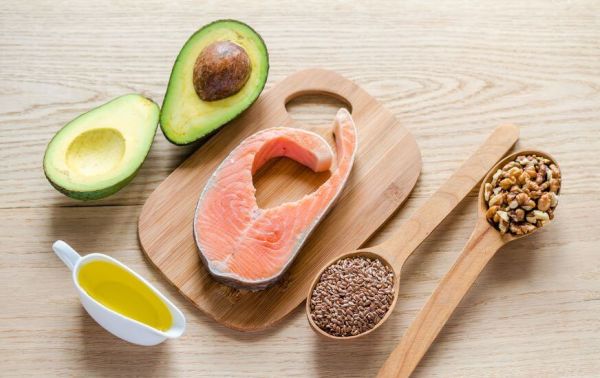The cult of “clean eating” is more popular than ever these days.
While I’m all for eating nutritious (“clean”) foods for the purposes of supplying our bodies with vitamins and minerals, eating nothing but these foods guarantees nothing in the way of building muscle or losing fat.
You can be the cleanest eater in the world and still be weak and skinny fat.
Why?
Because when it comes to body composition (how much muscle and body fat you have), how much you eat is more important than what.
You see, fat loss boils down to feeding your body less energy (via food) than it burns every day. We measure both the energy burned and eaten in calories or kilocalories.
When you feed your body fewer calories than it burns, you are creating what is known as a “calorie deficit.” Your body must get energy from somewhere, though, and so it turns to its fat stores. When you keep your body in a calorie deficit over time, total fat mass decreases. And maintaining a daily or weekly calorie deficit is the only way to do this.
The “clean eating” kicker is that “clean” calories count just as much as “dirty” calories when it comes to gaining or losing fat.
And what about when you’re focusing on building muscle? Many people are surprised to learn that total calorie intake affects your body’s ability to build muscle just as much as its ability to reduce body fat percentage.
This biological factor known as “energy balance” is the key.
Think of energy balance like your body’s energy checking account. A negative balance is a situation where your body is burning more energy than you’re feeding it (it’s in the red as far as energy goes). A positive balance, on the other hand, is a situation where your body is burning less energy than you’re feeding it (it’s in the black).
Now, as you already know, when a negative energy balance is sustained over time, total fat mass decreases. But this comes at a price: it also impairs the body’s ability to synthesize muscle proteins.
What is means is when you’re dieting to lose fat, your body simply can’t build muscle efficiently. This is why it’s commonly accepted that you can’t build muscle and lose fat, which is generally true but not always the case.
So, what this means is that when you want to maximize muscle growth, you must ensure you’re not in a calorie deficit.
Instead, you must ensure that your body is in a slight calorie surplus, or a positive energy balance.
What that means in terms of actual numbers varies from person to person. Some people’s metabolisms are extremely fast and they require vast numbers of calories every day just to gain a pound per week (which is what you want to see when you’re bulking properly), whereas others don’t require nearly as many.
Finding your body’s optimal calorie intake for maximum muscle growth will require a bit of trial and error, but you can start here:
- Eat 1 gram of protein per pound of body weight
- Eat 2 grams of carbohydrate per pound of body weight
- Eat 0.3 grams of fat per pound of body weight
Take those numbers and turn them into a simple meal plan of foods you like to eat, follow it every day, and see how your body responds.
Table of Contents
+Meal frequency is (basically) irrelevant.

You’ve undoubtedly heard that you need to eat 5 to 7 small meals per day to lose fat effectively. You’ve probably heard that it speeds up your metabolism and keeps hunger at bay.
Well, these claims seem to make sense at first.
Your metabolism does speed up when you eat because it has to work to digest the food and absorb the nutrients. Therefore, if you eat every few hours, your metabolic rate will be elevated all day, right? And what better way to avoid hunger than by eating throughout the entire day?
Well, like many of the myths that seem to make sense on paper, they just don’t pan out in clinical research. Let’s first address how eating food affects the metabolism.
The energy that your body must expend to digest and process proteins, carbohydrates, and fats is known as the thermic effect of food. How much of a boost your metabolism gets depends on how much food you eat. Small meals result in small increases in energy expenditure whereas larger meals result in larger increases.
This basic physiology is all well and good, but what does it mean in terms of actual weight loss? Does eating more frequently actually help you lose more weight by increasing daily energy expenditure or not?
Well, in an extensive review of literature, scientists at the French National Institute of Health and Medical Research looked at scores of studies comparing the thermic effect of food in a wide variety of eating patterns, ranging from 1-17 meals per day. In terms of 24-hour energy expenditure, they found no difference between nibbling and gorging. Small meals caused small, short metabolic boosts, and large meals caused larger, longer boosts, and by the end of each day, they balanced out in terms of total calories burned.
We can also look to a weight loss study conducted by the University of Ontario, which split into two dietary groups: 3 meals per day and 3 meals plus 3 snacks per day, with both in a caloric restriction for weight loss. After 8 weeks, 16 participants completed the study and researchers found no significant difference in average weight loss, fat loss, and muscle loss.
The bottom line is that increasing or decreasing meal frequency can help with dietary compliance, but it doesn’t increase or decrease total daily expenditure and thus fat loss.
Appetite control is another aspect of dieting where, according to various “gurus,” more frequent eating beats less frequent feeding. The truth is that this claim isn’t downright false—it’s just not a certainty.
A study conducted by the University of Missouri with 27 overweight/obese men found that after 12 weeks of dieting to lose weight, increasing protein intake improved appetite control, but meal frequency (3 vs. 6 meals per day) had no effect.
The University of Kansas investigated the effects of meal frequency and protein intake on perceived appetite, satiety, and hormonal responses in overweight/obese men. They found that higher protein intake led to greater feelings of fullness, and that 6 meals actually resulted in lower daily fullness than 3 meals.
Don’t think that 3 meals per day is the key, though. There are other studies wherein people felt fuller eating 5 or 6 meals per day than 3 meals, which made it easier for them to stick to their diets.
The bottom line is the appetite is a multi-faceted phenomenon, affected by both physical and psychological factors, and people can respond differently to more or less frequent eating.
So, how many meals should you be eating per day, then?
Well, our hunger patterns are established by our regular meal patterns, so it’s usually easiest to work around this, not against it.
That said, I recommend that you start by eating several small meals per day, with a serving of protein in each. In my experience, most people do best with this approach. They like the feeling of being able to eat every few hours and being able to eat different types of foods throughout the day.
Don’t think of that as a prescription, though. If you prefer fewer, larger meals, then eat that way. So long as your daily numbers are correct, you can’t go wrong.
As the cliché goes, the best dietary protocol is the one you’ll stick to, and reducing psychological stress goes far in increasing diet compliance and thus overall effectiveness.
Eat enough protein to build and preserve muscle.

Before I get into how much protein is enough, I’d like to review some basics to ensure we’re on the same page.
First, let’s talk about what a protein actually is. A protein is a molecule comprised of substances known as amino acids. Amino acids are the “building blocks” of proteins–they’re used to build protein molecules up, and protein molecules can break down into them.
There are many different types of proteins in the human body, and they perform all kinds of functions ranging from the formation of tissues, hair, and nails, to facilitating biochemical reactions, to cell signaling (hormones are proteins), and more.
Muscles are comprised of “muscle proteins,” and in order to build muscle tissue, the body requires a number of amino acids. The body is able to synthesize some of these amino acids, but others it must get from food (and these are known as “essential” amino acids).
It gets these amino acids from the protein content found in food. When you eat food with protein, your body breaks it down into a pool of amino acids, which it can then use to build muscle tissue (among other things).
If your diet contains too little protein, your body can become deficient in these essential amino acids and thus its ability to build and repair muscle tissue becomes impaired.
This is true whether you exercise or not. The basic processes whereby cells die and are replaced require these essential amino acids.
Regular exercise increases your body’s need for essential amino acids and thus protein. This is especially true if you’re lifting weights, because your body must repair the damage you’re causing to muscle fibers. This is why research has shown that athletes need to eat a high-protein diet to maximize performance.
To determine how much protein we need to maximize muscle growth, let’s look more at the research done with athletes.
Let’s start with athletic research conducted by scientists at McMaster University. They found that a protein intake of 1.3 to 1.8 grams per kilogram of body weight (.6 to .8 grams per pound of body weight) is adequate for stimulating maximal protein synthesis.
They noted, however, that protein requirements are higher in the case of frequent, intense training (which applies to anyone lifting heavy weights 4 to 6 times per week).
Researchers at the University of Western Ontario came to the same conclusion: 1.6 to 1.8 grams of protein per kilogram of body weight seems to be enough for athletes, but higher amounts can be beneficial depending on other factors such as total energy intake, carbohydrate availability, exercise intensity, duration and type, dietary protein quality, training history, gender, age, timing of nutrient intake, and more.
As you can see, athletes should meet a “bare minimum” intake of 0.6 to 0.8 grams of protein per pound of body weight, but there are times where more is better.
This actually agrees with old school bodybuilding advice that has been kicking around for decades now.
Specifically, the standard protein recommendation is about 1 gram of protein per pound of body weight, and higher levels of intake (1.2 to 1.5 grams of protein per pound of body weight) are often recommended when restricting calories for fat loss purposes
In my books and articles, I recommend 1 gram of protein per pound of body weight when bulking and maintaining, and 1.2 grams of protein per pound when cutting. (In the case of obesity, I recommend less—around .8 grams of protein per pound of body weight.)
And if 1.2 grams of protein per pound sounds excessive to you, consider the findings of a recent review of the matter conducted by researchers at AUT University. Here’s a quote from the paper:
“Protein needs for energy-restricted resistance-trained athletes are likely 2.3-3.1g/kg of FFM [1 – 1.4 grams per pound of fat free mass] scaled upwards with severity of caloric restriction and leanness.”
That is, when you’re weightlifting regularly and restricting calories, you should be eating anywhere from 1 to 1.4 grams of protein per pound of fat-free mass (which is everything in your body that isn’t fat), and if your calorie deficit is large (which isn’t advisable, by the way) or you’re already lean, you should eat more.
This is exactly in line with what I’ve seen in my own body and the hundreds of people I’ve worked with.
Maintaining an optimal calorie deficit of about 20% (you eat 80% of the calories your body burns every day) while also preserving strength and muscle requires quite a bit of protein every day. And as you get leaner, this becomes even more important.
Exact needs are hard to quantify, so I err on the side of being a little high. It’s always served me and my readers well, though—we lose little-to-no muscle or strength when cutting, and that’s partially due to a high protein intake.
Oh and last but not least, if you’re worried that eating high levels of protein is bad for your kidneys, don’t worry, this myth has been conclusively debunked.
Carbohydrates don’t make you fat—they help you build muscle.

The anti-carb hysteria is reaching a frenzied pitch these days, but it’s completely unfounded.
Carbohydrates aren’t the enemy. They don’t make you fat or unhealthy. In fact, carbohydrates are vitally important for building muscle and can even be useful when dieting for fat loss.
When you eat carbohydrates, one of the substances your body breaks them down into is known as glycogen. This is a form of potential energy that is stored primarily in the liver and muscles.
When you lift weights, you rapidly drain your muscles’ glycogen stores, and when you eat carbohydrates, you replenish these stores. By doing this and keeping your muscles “full” of glycogen, you improve performance and reduce exercise-induced muscle breakdown.
Another benefit of eating carbohydrates is the stimulation of the production of insulin, which is a hormone released by the pancreas that shuttles nutrients from your blood into your cells. What does this have to do with building muscle?
Well, insulin doesn’t directly induce protein synthesis like amino acids do, but it does have anti-catabolic properties. What that means is when insulin levels are elevated, the rate at which muscle proteins are broken down decreases. This, in turn, creates a more anabolic environment in which muscles can grow larger quicker.
That sounds good in theory, right? But does it pan in out clinical research? Yes, it does. There are several studies that conclusively show that high-carbohydrate diets are superior to low-carbohydrate varieties for building muscle and strength.
Researchers at Ball State University found that low muscle glycogen levels (which is inevitable with low-carbohydrate dieting) impair post-workout cell signaling related to muscle growth.
A study conducted by researchers at the University of North Carolina found that when combined with daily exercise, a low-carbohydrate diet increased resting cortisol levels and decreased free testosterone levels. (Cortisol, by the way, is a hormone that breaks tissues, including muscle, down. In terms of maximizing muscle growth, you want low resting cortisol levels and high free testosterone levels.)
These studies help explain the findings of other research on low-carbohydrate dieting.
For example, a study conducted by researchers at the University of Rhode Island looked at how low- and high-carbohydrate intakes affected exercise-induced muscle damage, strength recovery, and whole body protein metabolism after a strenuous workout.
The result was the subjects on the low-carbohydrate diet (which wasn’t all that low, actually—about 226 grams per day, versus 353 grams per day for the high-carbohydrate group) lost more strength, recovered slower, and showed lower levels of protein synthesis.
In this study, researchers at McMaster University compared high- and low-carbohydrate dieting with subjects performing daily leg workouts. They found that those on the low-carbohydrate diet experienced higher rates of protein breakdown and lower rates of protein synthesis, resulting in less overall muscle growth than their higher-carbohydrate counterparts.
All this is why I never drop my carbohydrate intake lower than about .8 grams per pound of body weight when cutting (and yes I get to 6% body fat eating this many carbs per day), and I’ll go as high as 2 to 2.5 grams per pound when bulking.
Dietary fat is necessary, but high-fat diets don’t deserve all the attention they’re getting.

Remember when low-fat dieting was all the rage? When fat-free products flooded the supermarkets and “gurus” used to tell us that dietary fats were the reason why people are fat?
Well, that pendulum has swung hard in the other direction. Now we’re told that carbohydrates are the real enemy and that we should be eating copious amounts of dietary fat every day if we want to be healthy, lean, and strong.
What gives?
Well, the truth is dietary fats play a vital role in the body. They’re used in processes related to cell maintenance, hormone production, insulin sensitivity, and more. If fat intake is too low, these functions can become compromised, which is why the Institute of Medicine recommends that adults should get 20 to 35% of their daily calories from dietary fat.
That said, those percentages were worked out for the average sedentary person, who often eats quite a bit less than someone that exercises regularly.
For example, I weigh about 190 pounds, and if I were the average, sedentary type, my body would burn about 2,000 calories per day (which is what I would be advised to eat so as to not gain or lose weight). Based on that, the IoM’s research says my body would need 45 to 80 grams of fat per day. That makes sense.
But I exercise 6 days per week and have quite a bit of muscle. My body burns about 3,000 calories per day, and if we were to blindly apply the IoM’s research to that number, my recommended fat intake would skyrocket to 65 to 115 grams per day. But does my body really need that much more dietary fat simply because I’m muscular and exercise regularly?
No, it doesn’t.
The bottom line is your body only needs so many grams of fats per day, and based on the research I’ve seen, if you exercise regularly, dietary fat can comprise 20 – 35% of your basal metabolic rate (measured in calories) and you’ll be fine.
Calculating this way, instead of based on your actual calorie intake, is more in line with the IoM’s research.
So, with that under our belt, let’s now look at high-fat diets, which are diets that have you getting 30% or more of your daily calories from dietary fat.
Marketers are jumping all over high-fat dieting at the moment, and one of the big alleged benefits is related to anabolic hormones. The claim is that a high-fat diet will increase testosterone levels and thus help you build muscle and strength.
As with most hormone-related claims, that’s not the whole story.
Yes, it’s well known that switching from a low-fat to a high-fat diet can increase free testosterone levels…but not by much. Not nearly enough to help you build more muscle.
For example, one study showed that men getting 41% of daily calories from fat had 13% more free testosterone than man getting just 18% of daily calories from fat. The findings were similar to those of another study conducted a decade earlier.
While that sounds nice, there’s a problem: small fluctuations in free testosterone, up or down, don’t help or hinder muscle growth. This isn’t just theory—it’s been demonstrated in clinical research.
A study conducted by McMaster University with young, resistance trained men had them lift weights 5 times per week for 12 weeks and follow a normal, high-protein diet. The primary finding of the study was that the exercise-induced spikes in anabolic hormones like testosterone, growth hormone, and IGF-1, which all remained within physiological normal ranges, had no effect on overall muscle growth and strength gains.
All subjects built muscle and strength, but the natural variations in anabolic hormone levels had no effects.
Research conducted by Charles R. Drew University of Medicine and Science also lends insight. Researchers administered varying levels of anabolic steroids and a drug to inhibit natural testosterone production to 61 young, healthy men for 20 weeks, and tested their leg strength and power on the Leg Press machine.
What researchers found was that muscle growth wasn’t significantly affected until testosterone levels moved below or above the physiological normal range, which is between 300-1,000 ng/dl.
In terms of total lean mass, subjects on the low end of that range weren’t far behind subjects on the high end. A significant increase in muscle growth wasn’t seen until testosterone levels surpassed the top of “normal” by about 20 to 30% (until they reached the 1,200 to 1,300 ng/dl range).
So, with all that considered, let’s now turn our attention back to high-fat dieting, and particular to gains versus benefits.
When you increase fat intake to 30%+ of your daily calories, you ultimately have to decrease carbohydrate intake to balance your total calorie intake (to make room for all the fat). And you have to reduce it quite a bit because, as you probably know, a gram of fat contains over double the calories of a gram of carbohydrate.
For example, if you’re eating 2,500 calories per day with 30% of calories from protein, 50% from carbohydrate, and 20% from fat, that looks like this (approximately):
- 190 grams of protein
- 310 grams of carbohydrate
- 55 grams of fat
If you switched to 30% of calories from protein, 40% from fat, and 30% from carbohydrate, it would look like this:
- 190 grams of protein
- 190 grams of carbohydrate
- 110 grams of fat
Based on what we talked about in the section on carbohydrate intake, you probably already know where I’m going here.
By reducing carbohydrate intake this much, you will be impairing your performance in the gym as well as your body’s ability to build muscle.
And what are you gaining by adding the fats? Nothing but an insignificant increase in testosterone levels, which will have no direct benefit in terms of building muscle.
It’s a double-whammy of fail, and it can be particularly troublesome when you’re dieting to lose weight, because, as you know, this primes your body for muscle loss.
Clean Eating is Important, But Isn’t Everything

Don’t mistake this article as me railing against eating healthy foods. I’m not a fan of the people trying to prove that you can “eat junk and get shredded”–long-term health matters more than getting super lean while eating boxes of Pop Tarts every week.
So yes, the majority of your daily calories should come from nutritious, healthy foods, but there’s much more that goes into proper meal planning for muscle growth or weight loss.
What are your thoughts on clean eating? Have anything else to share? Let me know in the comments below!
Scientific References +
- Storer TW, Magliano L, Woodhouse L, et al. Testosterone dose-dependently increases maximal voluntary strength and leg power, but does not affect fatigability or specific tension. J Clin Endocrinol Metab. 2003;88(4):1478-1485. doi:10.1210/jc.2002-021231
- West DWD, Phillips SM. Associations of exercise-induced hormone profiles and gains in strength and hypertrophy in a large cohort after weight training. Eur J Appl Physiol. 2012;112(7):2693-2702. doi:10.1007/s00421-011-2246-z
- Hämäläinen E, Adlercreutz H, Puska P, Pietinen P. Diet and serum sex hormones in healthy men. J Steroid Biochem. 1984;20(1):459-464. doi:10.1016/0022-4731(84)90254-1
- Dorgan JF, Judd JT, Longcope C, et al. Effects of dietary fat and fiber on plasma and urine androgens and estrogens in men: A controlled feeding study. Am J Clin Nutr. 1996;64(6):850-855. doi:10.1093/ajcn/64.6.850
- Dietary Reference Intakes for Energy, Carbohydrate, Fiber, Fat, Fatty Acids, Cholesterol, Protein, and Amino Acids (Macronutrients). National Academies Press; 2005. doi:10.17226/10490
- Howarth KR, Phillips SM, MacDonald MJ, Richards D, Moreau NA, Gibala MJ. Effect of glycogen availability on human skeletal muscle protein turnover during exercise and recovery. J Appl Physiol. 2010;109(2):431-438. doi:10.1152/japplphysiol.00108.2009
- Lane AR, Duke JW, Hackney AC. Influence of dietary carbohydrate intake on the free testosterone: Cortisol ratio responses to short-term intensive exercise training. Eur J Appl Physiol. 2010;108(6):1125-1131. doi:10.1007/s00421-009-1220-5
- Creer A, Gallagher P, Slivka D, Jemiolo B, Fink W, Trappe S. Influence of muscle glycogen availability on ERK1/2 and Akt signaling after resistance exercise in human skeletal muscle. J Appl Physiol. 2005;99(3):950-956. doi:10.1152/japplphysiol.00110.2005
- Denne SC, Liechty EA, Liu YM, Brechtel G, Baron AD. Proteolysis in skeletal muscle and whole body in response to euglycemic hyperinsulinemia in normal adults. Am J Physiol - Endocrinol Metab. 1991;261(6 24-6). doi:10.1152/ajpendo.1991.261.6.e809
- Gelfand RA, Barrett EJ. Effect of physiologic hyperinsulinemia on skeletal muscle protein synthesis and breakdown in man. J Clin Invest. 1987;80(1):1-6. doi:10.1172/JCI113033
- Fryburg DA, Jahn LA, Hill SA, Oliveras DM, Barrett EJ. Insulin and insulin-like growth factor-I enhance human skeletal muscle protein anabolism during hyperaminoacidemia by different mechanisms. J Clin Invest. 1995;96(4):1722-1729. doi:10.1172/JCI118217
- Howarth KR, Phillips SM, MacDonald MJ, Richards D, Moreau NA, Gibala MJ. Effect of glycogen availability on human skeletal muscle protein turnover during exercise and recovery. J Appl Physiol. 2010;109(2):431-438. doi:10.1152/japplphysiol.00108.2009
- Miller SL, Wolfe RR. Physical exercise as a modulator of adaptation to low and high carbohydrate and low and high fat intakes. Eur J Clin Nutr. 1999;53:s112-s119. doi:10.1038/sj.ejcn.1600751
- Robergs RA, Pearson DR, Costill DL, et al. Muscle glycogenolysis during differing intensities of weight-resistance exercise. J Appl Physiol. 1991;70(4):1700-1706. doi:10.1152/jappl.1991.70.4.1700
- Helms ER, Zinn C, Rowlands DS, Brown SR. A systematic review of dietary protein during caloric restriction in resistance trained lean athletes: A case for higher intakes. Int J Sport Nutr Exerc Metab. 2014;24(2):127-138. doi:10.1123/ijsnem.2013-0054
- Lemon PWR. Beyond the Zone: Protein Needs of Active Individuals. J Am Coll Nutr. 2000;19:513S-521S. doi:10.1080/07315724.2000.10718974
- Phillips SM, van Loon LJC. Dietary protein for athletes: From requirements to optimum adaptation. J Sports Sci. 2011;29(SUPPL. 1). doi:10.1080/02640414.2011.619204
- Tipton KD, Wolfe RR. Protein and amino acids for athletes. In: Journal of Sports Sciences. Vol 22. ; 2004:65-79. doi:10.1080/0264041031000140554
- Lesauter J, Hoque N, Weintraub M, Pfaff DW, Silver R. Stomach ghrelin-secreting cells as food-entrainable circadian clocks. Proc Natl Acad Sci U S A. 2009;106(32):13582-13587. doi:10.1073/pnas.0906426106
- Leidy HJ, Campbell WW. The Effect of Eating Frequency on Appetite Control and Food Intake: Brief Synopsis of Controlled Feeding Studies. J Nutr. 2011;141(1):154-157. doi:10.3945/jn.109.114389
- Leidy HJ, Armstrong CLH, Tang M, Mattes RD, Campbell WW. The influence of higher protein intake and greater eating frequency on appetite control in overweight and obese men. Obesity. 2010;18(9):1725-1732. doi:10.1038/oby.2010.45
- Leidy HJ, Tang M, Armstrong CLH, Martin CB, Campbell WW. The effects of consuming frequent, higher protein meals on appetite and satiety during weight loss in overweight/obese men. Obesity. 2011;19(4):818-824. doi:10.1038/oby.2010.203
- Cameron JD, Cyr MJ, Doucet É. Increased meal frequency does not promote greater weight loss in subjects who were prescribed an 8-week equi-energetic energy-restricted diet. Br J Nutr. 2010;103(8):1098-1101. doi:10.1017/S0007114509992984
- Bellisle F, McDevitt R, Prentice AM. Meal frequency and energy balance. Br J Nutr. 1997;77(S1):S57-S70. doi:10.1079/bjn19970104
- Zito CI, Qin H, Blenis J, Bennett AM. SHP-2 regulates cell growth by controlling the mTOR/S6 kinase 1 pathway. J Biol Chem. 2007;282(10):6946-6953. doi:10.1074/jbc.M608338200










